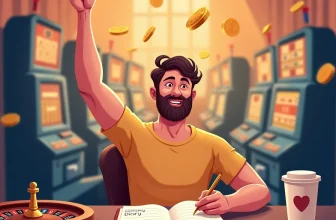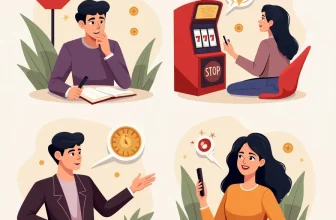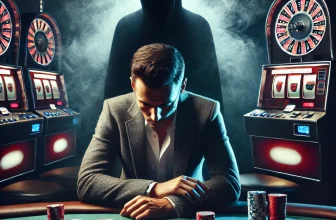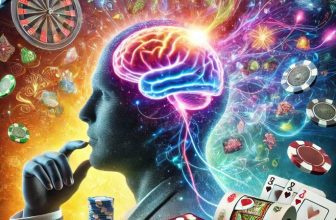Introduction
Gambling in Russia and around the world has long been part of popular culture. Some perceive it as harmless entertainment, others - as a way to get rich quickly, and still others - as a dangerous trap that can ruin a life. But what happens in a person's soul when the stakes become higher and the losses - more painful? Why do some players sink into depression, while others get off with only mild disappointment? And most importantly - how to avoid those very "emotional swings" that knock us off course in life? We will talk about this in our article today.
I am a professional psychologist and my task is to tell about how gambling can lead to depressive states, and what to do about it to stay sane and clear-headed. I will try to explain everything in simple language, with a little humor, but without losing scientific and practical value. Ready? Then let's go!
Content
- Introduction
- 1. Why can losing cause depression?
- 2. How to avoid “emotional swings”?
- 3. Working methods of self-control
- 4. Psychological mechanism: why is excitement so addictive?
- 5. The relationship between depression and gambling addiction
- 6. How to recognize the first signs of depression in a player?
- 7. Methods of preventing depression in players
- 8. What to do if you already feel depressed because of gambling?
- 9. Does the "magic pill" exist?
- 10. Advice from a professional psychologist (and a bit of a blogger)
- 11. Looking to the Future: 2025 and Online Games
- 12. Conclusion
- Brief FAQ
1. Why can losing cause depression?
1.1 The Disappointment Factor
Let's imagine a classic situation: you go to a casino or open your favorite betting app, full of enthusiasm, and here's the first bid... and then the second... and the third. Thoughts of future victories flash through your head, of how you can already imagine yourself with a cash prize in your hands. But the bets don't come in, the chips float away, and with them the good mood goes away.
What happens on a psychological level? Losing in gambling is a direct confrontation with unfulfilled expectations. After all, deep down we all hope for the best, especially when it comes to money. And when reality turns out to be far from this optimistic picture, we feel deceived, disappointed and vulnerable. This state can easily turn into depression if such “surprises” are repeated regularly.
1.2. "Credit of trust" in one's own luck
When we place a bet, we give ourselves a “credit of confidence.” “I’m definitely going to get lucky,” “My number will definitely come up now” – these thoughts fuel our excitement. But as soon as luck slips away, we remain indebted to our own ego. We feel guilty for making the wrong decisions, angry at ourselves for being overconfident and careless. All this is compounded by financial losses, which can cause even stronger negative emotions. This is how a process begins where self-esteem falls and the feeling of helplessness grows.
1.3. Financial pressure
If a person plays for a quick buck or, even worse, tries to win back money already lost, then losing becomes doubly painful. Financial problems are one of the key factors contributing to the development of depression. Debts, unpaid bills, the feeling that “just a little more and I will win, but no” - all this aggravates the situation. A person begins to feel hopelessness, because instead of solving financial problems, he only aggravates them.
1.4 Social condemnation and loneliness
Many players, faced with a series of losses, withdraw into themselves. Society as a whole treats gambling cautiously, and sometimes even condemningly. A person may feel ashamed and afraid to admit to family, friends or colleagues that he has lost a significant amount of money. This creates an effect of isolation, when there is no support and you have to cope with problems on your own. And loneliness is fertile ground for depression.
2. How to avoid “emotional swings”?
2.1 Understand the nature of gambling
To avoid getting caught in the “emotional swings,” it’s important to realize that gambling is designed to trigger emotional surges. The reward system in our brains responds to the slightest chance of winning by releasing doses of dopamine, the pleasure hormone. When we take risks, we literally become “addicted” to these surges. But if we remember that the chances of winning are usually lower than they seem, we can assess the situation more soberly and be less susceptible to illusions.
2.2. Set realistic (not inflated) goals
Sometimes people place bets with the aim of getting rich instantly: “I’ll put in 10 thousand now – in half an hour I’ll have 100!” But this is a direct path to disappointment and emotional roller coasters. It is much wiser to approach gambling as entertainment, where the main goal is to have fun, and not to hit the jackpot. When expectations are adequate, both the loss and gain are perceived more calmly.
2.3. Take breaks and “reboot”
"Emotional swings" often occur when we sit in a game for too long, lose track of time, and don't have time to digest our emotions. A simple practice will help here - take a break every 15-20 minutes. Get up, drink some water, get some fresh air, distract yourself with something else. This technique gives the brain a chance to cool down and look at the situation from the outside.
2.4. Don't try to win back at any cost
When a person gets into the minus, his psyche screams: “We need to get the money back!” However, this often leads to even higher bets and, accordingly, to more painful defeats. The right move is to accept the loss as the price for entertainment and, perhaps, draw conclusions for future gamesBut don’t give in to despair and don’t try to “fix the situation” immediately.
3. Working methods of self-control
3.1. Mindfulness and the “here and now” technique
One of the main enemies of a person in gambling is the automatism of actions. We get so carried away by the process that we stop noticing how the stakes are growing and how the money is disappearing. The “here and now” technique (mindfulness) teaches us to concentrate on the current moment: what am I feeling now, why am I making this bet, how justified is it? When you learn to ask yourself such questions, you take control of the situation into your own hands.
3.2. Keeping a player's diary
Get yourself a notebook or use a note-taking app where you will write down each game session: what emotions you started with, what goals you set, how much you won or lost, and how you felt afterwards. It is important to record both objective figures (how much money you spent) and subjective feelings (how you rated your experience). Such a diary allows you to track dynamics, see patterns and notice alarm signals in time.
3.3 Prioritization
Often people who suffer from "emotional swings" in gambling do not have a clear understanding of why they play and what is important to them in life. Psychologists advise writing down priorities: family, work, health, personal development. Where is the place for gambling on this list? If gambling activity begins to climb to the top lines, displacing other areas, this is an alarm bell.
3.4. Time and money limitations
The simplest way to self-control is to set limits in advance. For example, "I spend no more than 5% of my salary on bets and spend no more than 2 hours a week playing." If you feel that such limits have become tight and you are drawn to break them, then the risk of "emotional swings" is growing. The sooner you understand this, the easier it will be to stop in time.
3.5. Contact a specialist
Professional help is also welcome. If you feel that you can’t cope on your own, you are welcome to see a psychologist or psychotherapist. They will help you understand the reasons for your attitude to risk and work through internal conflicts that lead to depression. This is especially true if there is a lot of money at stake and you feel that the emotional swings have turned into a real “roller coaster”.
4. Psychological mechanism: why is excitement so addictive?
4.1. The reward system in the brain
When we win, our brain produces dopamine, a neurotransmitter responsible for feelings of satisfaction and motivation. Simply put, it says, “Hey, that was cool, let’s do it again!” Even if the win is random, the brain remembers the feeling and encourages us to take risks again. As a result, a positive feedback loop is formed: the more times we catch the euphoria of winning, the more we want to repeat it again.
4.2. The role of adrenaline
Gambling is not only about money, but also about thrills. We get a rush of adrenaline when we expect a result. Some people's hands shake, some people's hearts beat faster, and some people, on the contrary, fall into ecstasy. Adrenaline is a hormone that triggers the "fight or flight" response, and in the context of the game it creates a feeling of "here and now". But excessive adrenaline releases can overload the nervous system, and after such surges, an "emotional pit" often occurs.
4.3. The “near victory” effect
Are you familiar with the situation when two identical symbols appear on a slot machine, and there is literally one step missing until the third one? Or when you sports betting predicted the outcome of three matches, but the fourth one let you down? Psychologists call this the "near-win effect." It stimulates the brain as much as an actual win, because we think: "Just a little more, and I would have succeeded!" This makes us continue to play despite objective failures.
5. The relationship between depression and gambling addiction
5.1. Gambling addiction: what is it?
When we talk about serious gambling problems, we cannot ignore such a concept as “ludomania” – pathological gambling. dependence. This is a condition in which a person cannot control his desire to play, despite financial, social and psychological losses. Gambling addiction is recognized worldwide as a mental disorder that requires professional treatment. And, as practice shows, it very often goes hand in hand with depression.
5.2. Depression as a consequence and as a cause
Depression can arise as a result of constant losses, a feeling of hopelessness and accumulated debts. But the opposite situation also occurs: a person is already in a depressive state and tries to "raise" his mood with the help of gambling, to escape from problems. As a result, a vicious circle is formed: depression pushes to gambling, and gambling, bringing disappointment, only intensifies depression.
5.3. Mechanisms for strengthening dependence
When a person is depressed, their willpower and ability to think critically are reduced. They are more susceptible to impulsive actions and suggestion. This is a fertile ground for the formation or aggravation of gaming addiction. On the one hand, games bring short-term relief and distraction, on the other hand, they lead to an even stronger feeling of guilt and despair.
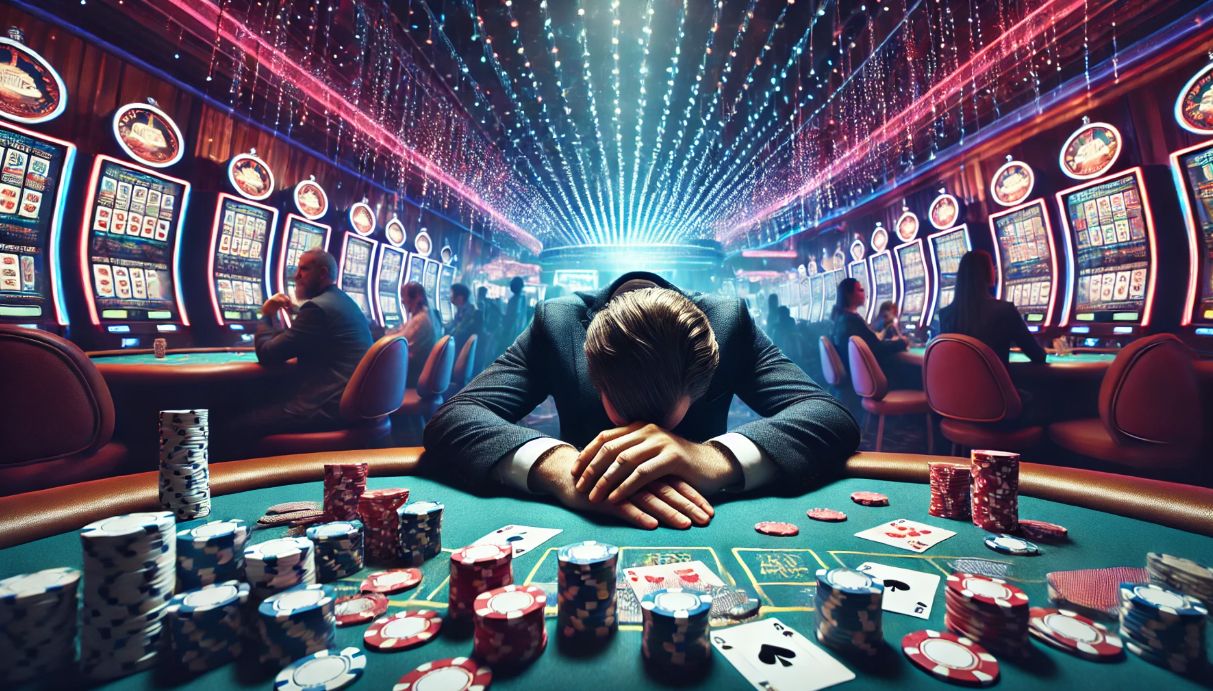
6. How to recognize the first signs of depression in a player?
6.1 Loss of interest in everyday life
A person in a depressive state stops enjoying the usual things: food, meeting with friends, hobbies, sports. Everything seems gray and meaningless. If at the same time he continues to reach for gambling, hoping to "stir up", this is a serious alarm bell.
6.2 Constant thoughts about losses
Thoughts about lost money and "I'm a loser" begin to dominate. The person feels guilty before his family, his self-esteem drops. Instead of solving problems, he can spend hours replaying in his head moments where "he could have won, but didn't."
6.3. Sleep and appetite disorders
Depression is often accompanied by insomnia or, conversely, constant drowsiness. Appetite may disappear or, conversely, become uncontrollable. All this affects the physical condition, reducing the overall tone of the body.
6.4. Desire to isolate
A player who experiences depressive symptoms may avoid socializing, skip work or school, or withdraw into themselves. They are ashamed to admit to the problem and are afraid of being judged. As a result, social support is reduced to zero, and loneliness only worsens the situation.
7. Methods of preventing depression in players
7.1 Regular physical activity
Physical exercise helps produce endorphins, the natural "happiness hormones." This could be jogging, yoga, swimming, or just a brisk walk. Sports not only improve your mood, but also distract you from obsessive thoughts about the game and losing.
7.2. Communication with relatives and friends
Often, depressed players are embarrassed to talk about their problems, fearing criticism. But without the support of others, it is more difficult to fight depressive moods. Let it be at least one person you trust: a friend, relative, colleague. An open conversation is the first step to a solution.
7.3. Clear budget planning
To avoid catastrophic financial losses, it makes sense to allocate funds in advance. Set a limit on games, and if you reach it, close the application, leave the casino, do whatever, but do not violate this bar. Reward yourself for discipline, even if you have lost all the "permitted" money.
7.4. Self-education and development of new skills
Sometimes depression develops against the background of a feeling of emptiness and aimlessness. New interests, courses, books, hobbies can fill life with meaning different from betting and trying to hit the jackpot. When we grow professionally or spiritually, we have less time and desire to waste energy on emotional swings.
8. What to do if you already feel depressed because of gambling?
8.1 Acknowledge the problem
The first step is to realize that the depressive feelings are connected specifically with gambling. Sometimes people try to blame everything on stress at work, bad weather or family troubles. But if you realize that gambling and losses are constantly spinning in your head, it’s time to sound the alarm.
8.2. Restrict access to games
The second step is to make it as difficult as possible for yourself to gamble. Block apps on your phone, set filters on websites, limit your access to money that can be quickly spent on bets. Tell your loved ones about your decision - let them help you stay within the limits.
8.3. Find "backup airfields" for emotions
If gambling was a way for you to get an adrenaline rush or escape from the routine, it is important to find an alternative. These could be active sports, extreme tourism, computer games (but not gambling!), creativity, quests, dancing - anything that gives an emotional boost, but does not carry such financial risks and depressive consequences.
8.4. Contact a specialist
If you feel that you can no longer cope, do not delay visiting a psychologist or psychotherapist. Nowadays, there are many programs and methods that help people get out of the depressive state associated with gambling. A specialist will help you identify the underlying reasons why you got hooked on gambling and will tell you how to restore emotional balance.
9. Does the "magic pill" exist?
Many people ask: is there a universal method that is guaranteed to get rid of problems with gambling and depression? Unfortunately, there is no magic pill. We are all different, and the reasons why a person gets carried away with gambling are also different. Some are helped by strict discipline and rational thinking, others by psychotherapy and support from loved ones, and some find salvation in a new hobby or moving to another city. The main thing is to understand that this is work on yourself, and it is not an easy job, it requires time, effort and a conscious approach.
10. Advice from a professional psychologist (and a bit of a blogger)
-
Do not play when you are stressed or depressed. If you are in a bad mood, have problems at work or in your family, postpone your visit. casino or bookmakerIn this state, you are more vulnerable to emotional swings.
-
Plan in "safety zones". Before you start playing, set yourself a financial and time limit. Strictly adhere to these limits. When they are reached, leave.
-
Analyze your emotions. Ask yourself: “Why am I gambling now? For fun? Or trying to forget? Or hoping to solve financial problems?” The answer to this question can say a lot about your real motives.
-
Seek support. Don't be afraid to talk about your experiences with loved ones or even thematic communities on the Internet. You may find that you are not alone in your problem.
-
Take care of your health. Proper nutrition, sleep, exercise, walks – all these “trivial” things strengthen the nervous system and help cope with stress.
-
If something goes wrong, contact a specialist. A psychologist or psychotherapist is not an enemy or a magician, but a professional who will help you understand the causes of your emotions and teach you how to manage them.
11. Looking to the Future: 2025 and Online Games
We live in an era when gambling is rapidly moving to an online format. In 2025, virtual reality and augmented reality technology can make the gaming space even more exciting and realistic. This means that the number of temptations and opportunities to "immerse yourself" in the game will only grow. At the same time, methods of psychological assistance, including remote assistance, will also develop. Online sessions with psychologists already exist, mutual aid forums, mobile applications for meditation and emotion control.
But no matter how technologically advanced the gaming industry has become, the human psyche remains the same. We are still vulnerable to emotions, especially if we cannot control them. Therefore, the main message will remain unchanged: take care of yourself, your financial resources and your mental health.
12. Conclusion
Gambling and depression are phenomena that can intertwine and reinforce each other. Losing at gambling often leads to feelings of inadequacy, financial problems, social isolation. All of these can become a breeding ground for depression. But the good news is that we are not powerless. We can learn to recognize warning signs, control our behavior, and seek help if we feel that the situation is getting out of control.
The main thing is to understand that any "emotional swings" are manageable if we approach our lives consciously. Self-control, the ability to analyze your motives, correctly prioritize and seek support - all these are tools that allow you not only to avoid deep depression, but also to make the game a truly enjoyable and safe entertainment.
Let gambling bring you only positive emotions, and let depression pass you by! If you notice that losses make you feel too much, don’t be afraid to take a step back and rethink your attitude to betting. After all, the most important bet in our lives is our mental health and well-being.
Brief FAQ
Question: Could depression be the root cause of gambling addiction?
Response: Yes, it happens. Some people in depression look for a way to "shake themselves up" and resort to gambling. But this often leads to even greater emotional failures.
Question: Are there any quick ways to get rid of emotional swings?
Response: Completely and quickly - unlikely. But you can temporarily stabilize the condition by taking a break from the game, using breathing techniques, distracting yourself with physical activity. For a long-term solution, it is better to reconsider your attitude to the game and contact a specialist.
Question: How do I know if gambling is affecting my psyche?
Response: If you notice that you have become irritable, apathetic, losing interest in other activities, often thinking about losing, then it’s time to sound the alarm.
Question: Can positive thinking help?
Response: A positive attitude is important, but it should not be confused with self-deception. A sober assessment of risks, the ability to admit failure and stop in time - this is what really helps to avoid depression.
Question: What is the best way to deal with the guilt of losing?
Response: It is important to remember that guilt does not solve problems. Instead of self-criticism, it is better to analyze the reasons for the loss, draw conclusions and move on. If the feeling of guilt becomes unbearable, talk to a psychologist.
This article is written for anyone who wants to better understand the connection between gambling and depression. I hope my advice will help you avoid "emotional swings" and maintain mental balance. Remember that gambling should remain entertainment, and not turn into a source of suffering. Take care of yourself and be attentive to your emotions
